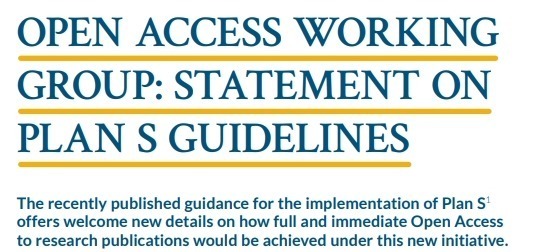How to Bring Prestige to Open Access - and Make Science More Reliable
By creating journals that put a premium on replicability, grant-funding agencies can revolutionize the publishing landscape.

Send us a link
By creating journals that put a premium on replicability, grant-funding agencies can revolutionize the publishing landscape.

With the membership of NSTC, the main public research funding body in the Republic of Zambia, cOAlition S now has members in Europe, North America, and Africa, and has received further support in the Middle East and Asia, with particular support by China.
With thousand of pages of feedback on the Plans S implementation guidance, what themes emerged that might guide next steps?

OPERAS, the European research infrastructure dedicated to open scholarly communication in the Social Sciences and Humanities, provides its recommendations to the guidance document on the implementation of Plan S.

On the 31th of January NWO and ZonMw organised a consultation meeting as part of the public feedback on the implementation of Plan S. The meeting was very well attended with over 250 people representing all segments of the Dutch research community.
The AHA fully supports broad access to the resources required to create new knowledge and share it as widely as possible. However, concerns about the principles set out in Plan S have led the AHA to write a letter to Coalition S members regarding the potential for harm to humanities scholarship.
As a community of 140 organisations who are committed to the advancement of open access publishing and who represent the majority of the of the OA journal output in the DOAJ*, OASPA is of course very supportive of the intentions of Plan S, as we commented previously at the beginning of October.
The recently published guidance for the implementation of Plan S offers welcome new details on how full and immediate Open Access to research publications would be achieved under this new initiative.

Smaller publishers may struggle to afford costs of satisfying open-access initiative's rules.

Read the joint response to the implementation guidance forPlan S as issued by three organisations representing early-career and senior researchers in Europe.
Further to my other post earlier this week, I have added the additional points to my response letter to the Plan S implementation guidelines. These centre around monographs (9), REF involvement in Plan S (10), infrastructural support (11), the "time of publication" (12), clarification of the term "quality" (13), compliance of existing software with repository requirements (14), publisher deposition (15), and the ability to pursue defamation suits for wrongful attribution and reputational damage with the waiver of moral rights under CC BY 4.0 (16). If number 16 could be resolved, the open licensing landscape would be much clearer. The full letter is now available.

An existential threat. That's what scientific societies supported by journal subscriptions call Plan S.

Does it matter that there's no record of the Plan S leader publishing in a peer-reviewed journal?
Much of the debate on Plan S seems to concentrate on how to make toll access journals open access, taking for granted that existing open access journals are Plan S compliant. We suspected this was not so, and set out to explore this using DOAJ's journal metadata. We conclude that an overwhelmingly large majority of open access journals are not Plan S compliant, and that it is small HSS publishers not charging APCs that are least compliant and will face major challenges with becoming compliant. Plan S need to give special considerations to smaller publishers and/or non-APC-based journals.

Open Acess and Plan S in particular create a conflict between editorial quality and the cost of publication.

The Confederation of Open Access Repositories (COAR) reiterates its support for the goal of Plan S to achieve “immediate Open Access to all scholarly publications from research”.
ALLEA welcomes the ambition of the coalition of European research funders to move the scientific publishing system towards open access; however, broader consultation with all parties is required during the implementation phase.
Plan S implementation guidance has not provided reassurance to anxious society publishers.

cOALition S asks for feedback on the Plan S implementation plan.